'I Am Tired of People Lying': Amid Mistrial Momentum, Michael Avenatti Is Cooperating in a Lawsuit Against Mark Geragos
Avenatti's cooperation in the lawsuit against Geragos comes amid marked optimism about his fate with two criminal appeals, pending a second wire fraud trial scheduled next month in New York.
December 28, 2021 at 07:20 PM
12 minute read
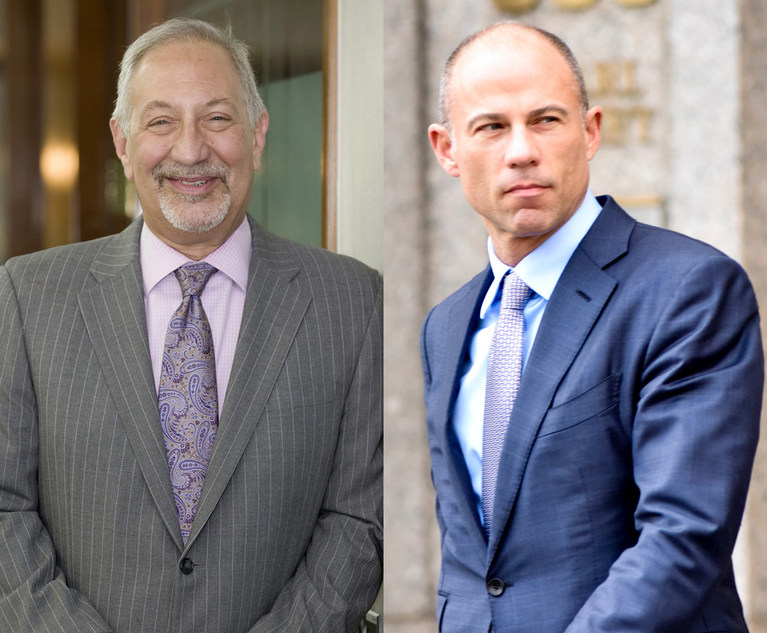 (L-R) Mark Geragos and Michael Avenatti. (Photos: Nicholas Koon and David Handschuh/ALM Media)
(L-R) Mark Geragos and Michael Avenatti. (Photos: Nicholas Koon and David Handschuh/ALM Media)
With two criminal appeals and a second wire fraud trial pending, Michael Avenatti's busy 2022 also includes a case that could aid in his post-mistrial momentum: an ex-client's lawsuit against lawyer Mark Geragos over the Nike extortion plot.
Avenatti has cited the evidentiary violations that prompted his mistrial in August as a reason his three felony convictions in the Nike case should be tossed, and he warned in a recent filing that the criminal case involving Stormy Daniels is "faltering" because witnesses withheld evidence.
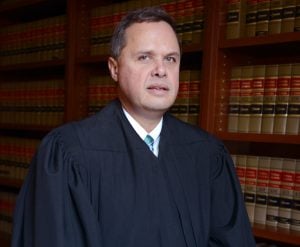 U.S. District Judge Paul Gardephe of the Southern District of New York.
U.S. District Judge Paul Gardephe of the Southern District of New York. Now the lawsuit against Geragos is giving Avenatti a chance to further establish a court record about Geragos' role as an uncharged coconspirator in the Nike plot, which U.S. District Judge Paul Gardephe said was a reason Avenatti deserved a light prison sentence.
Avenatti told Law.com he was to begin testifying Tuesday in a deposition with lawyers for his ex-client, youth basketball coach Gary Franklin, whose claims against Geragos include legal malpractice, civil conspiracy, fraud and aiding and abetting.
Avenatti last week requested Gardephe lift a protective order on documents in the Nike case so they can be referenced in the deposition.
"I am agreeing to testify because I am tired of people lying about what happened in connection with the Nike matter. I want the truth and the facts to be known. Let the chips fall where they may," Avenatti said in an email sent through a paralegal in accordance with court restrictions on his Internet access.
The litigation also could come in handy should his bid to throw out his jury conviction succeed.
"Aside from his testimony, he may have an interest in seeing that litigation go forward," said Joshua Robbins, a former federal prosecutor and co-chair of Buchalter APC's white-collar and investigations practice, who is not involved in the case. "He's not a party, and he's already been convicted, so it can't hurt him. Unless there's a retrial, then it could potentially benefit him."
Geragos' lawyers did not immediately respond to a request for comment.
Deposition Comes Amid Possible Trial Delay
Filed in Los Angeles County Superior Court, the lawsuit reveals Geragos' full defense against accusations that he extorted Nike alongside Avenatti, saying Franklin "erroneously assumes that Avenatti lied to Franklin but was truthful with Geragos."
"Geragos valued his relationship with Nike, was never going to be adverse to Nike in a legal matter, and saw himself as a calming force on Avenatti," according to a July 23 filing. "Geragos was not comfortable with Avenatti's conduct, and terminated his involvement with Nike and Avenatti in relation to Franklin at the March 21, 2019 meeting or immediately afterward outside of Nike's presence."
Geragos never testified in Avenatti's 2020 trial after Gardephe rejected a motion from Avenatti to compel his testimony, or force prosecutors to grant him immunity.
But the celebrity lawyer's involvement still loomed over the case: Gardephe said at Avenatti's sentencing that Geragos "suffered no consequences as a result of his conduct, and he was a central figure in the criminal conduct."
Avenatti's current willingness to answer questions about Geragos under oath comes amid marked optimism about his own fate in his cross-country criminal proceedings.
Politico Magazine on Dec. 22 ran a lengthy profile detailing Avenatti's belief that the government targeted him because of his willingness to take on then-President Donald Trump, which reignited interest in Avenatti in some political circles and generated big discussion online. And in his rejected request to be allowed outside for daily exercise, Avenatti said he "has significant reason to continue to fight the allegations against him, and remain fully compliant with all bail conditions," and cited his two appeals and the upcoming Daniels trial.
Now the scheduling of that trial is in question: Avenatti's public defenders are asking Judge Jesse Furman in the Southern District of New York for a four-month delay after prosecutors subpoenaed information from Avenatti that he says is buried in the digital files recently released to him in his California case.
Prosecutors want the information, which includes firm financial data and records related to Avenatti's work with Daniels, to prepare for his possible testimony. And Avenatti's lawyers said in their trial continuance request, "There is a strong likelihood that Mr. Avenatti will testify in his own defense."
"Because the defense cannot possibly identify all of the materials relevant to Mr. Avenatti's defense or responsive to the government's subpoena in time for a January 24, 2022 trial date, a substantial adjournment is warranted," according to the filing, which also cites the Omicron COVID-19 variant.
'A Danger to the Community'
Avenatti on Dec. 16 obtained permission to sit for depositions in the Central District of California from Senior U.S. District Judge James Selna, who has handed Avenatti a mix of rulings in the nearly three years Selna's had the client embezzlement and tax fraud case.
 Senior U.S. District Judge James Selna of the Central District of California in Santa Ana. (Photo: Jamie Rector for ALM)
Senior U.S. District Judge James Selna of the Central District of California in Santa Ana. (Photo: Jamie Rector for ALM) It was Selna who revoked Avenatti's bond six days before the Nike trial began in January 2020. This resulted in Avenatti being held in solitary confinement at the Metropolitan Correctional Center, in conditions Gardephe said at sentencing were "hard to believe … could occur in the United States of America."
But Selna is also the reason Avenatti got out of jail: He's allowed Avenatti to stay at a friend's home in Venice, California, with an ankle monitor since April 2020 because of the risk Avenatti could contract COVID-19 in custody.
And Selna is the judge who granted Avenatti's request for a mistrial after the U.S. Attorney's Office discovered thousands of previously undisclosed records on Avenatti's seized law firm servers.
Days before, Selna had taken the unusual step of reopening a search warrant more than 18 months after it was served to allow for the additional searches.
Still, the judge made clear he won't budge on Avenatti's home-confinement restrictions. He rejected a request for bail last May that would have allowed Avenatti to leave home confinement. Then on Dec. 16 he rejected Avenatti's request to be allowed outside for up to two hours of daily exercise.
"I made a finding more than a year ago that Mr. Avenatti is a danger to the community, and the Ninth Circuit affirmed that finding, and nothing has changed," Selna said.
Meanwhile, Gardephe is allowing Avenatti to delay his 30-month Nike sentence so Avenatti can be out of custody for the Daniels trial and the California proceedings. And Avenatti is gearing up for a new evidence fight, asking Gardephe on Dec. 2 to issue an indicative order telling the Second Circuit Court of Appeals Gardephe would grant a new trial if he had jurisdiction.
Could California Mistrial Affect Nike Convictions?
Avenatti's request stems from the separate case in California, and the financial analysis California prosecutors obtained from hired expert John Drum of the Analysis Group.
Drum's calculations were used to show jurors how Avenatti allegedly misappropriated client money, though Selna said when granting the Aug. 24 mistrial that other financial data discovered by California prosecutors mid-trial could have been used by Avenatti to try to discredit Drum.
Now Avenatti is arguing Drum's analysis discredits a key theory from New York prosecutors in his Nike trial: that Avenatti was desperate for money when he made the demands to Nike that a jury concluded were extortive.
"While it told the jury over and over that Mr. Avenatti was 'desperate' and had no other way out, it withheld its expert's contrary opinion that Mr. Avenatti's practice was profitable and generated positive cash flow, meaning that he would have been able to generate the cash required to manage his debts without a penny from Nike," according to the letter to Gardephe from Avenatti's current lawyer in the Nike case, Benjamin Silverman in New York.
Prosecutors dispute they ever had access to the information, distinguishing between the U.S. Attorney's Office in the Southern District of New York and the office in the Central District of California. They also say Drum's information "is not exculpatory," because it's about "cash flow analyses for years prior and irrelevant to the conduct in this case, for a law firm that was in bankruptcy before the defendant committed the offenses charged in this case," according to the Dec. 10 response from assistant U.S. attorneys Matthew Podolsky, Daniel Richenthal and Robert Sobelman.
Also, the information prosecutors presented to jurors focused not on revenue but on debt. including a personal $5 million debt Avenatti owes former law partner Jason Frank and money owed to his ex-wives.. Avenatti stipulated to the personal debt amount prior to trial, though it didn't include another $10 million his now-bankrupt law firm owes Frank.
Gardephe has not yet ruled on Avenatti's request.
Prosecutors Dispute Brady Violation
The lead prosecutor in California, Assistant U.S. Attorney Brett Sagel, referenced Avenatti's letter to Gardephe during the Dec. 16 hearing with Selna, saying "not always a standard from what I've been reading lately" when the judge told him he could offer any comment "just as long as they're relevant."
Sagel and the other prosecutor who worked the California trial, Alex Wyman, have made clear they disagree with Selna's conclusion that the financial data discovered mid-trial constituted an evidentiary violation under Brady v. Maryland, which governs prosecutors' disclosure of exculpatory evidence.
"Simply put, the government's position is that no Brady violation occurred," they said in a Sept. 13 filing.
Sagel and Wyman never searched Avenatti's law firm servers themselves because of the attorney-client privilege issues involved.
Instead, the U.S. Attorney's Office invoked its privilege-review team process, and separate Department of Justice employees searched the servers. And under their theory of the wire fraud case, Avenatti's alleged crimes commenced when he allegedly lied to his clients about the true terms of their settlements and allegedly spent the money elsewhere, and any payments he gave them were alleged lulling payments that perpetuated his alleged scheme.
Still, Selna said information such as additional payments to clients could be used in Avenatti's defense, and he said prosecutors should have been on notice that additional financial data related to the firm existed after Avenatti's paralegal, Judy Regnier, referenced the Tabs3 billing software in a July 2019 interview with investigators.
Selna said prosecutors committed no misconduct and rejected a double-jeopardy motion from Avenatti, but he later said Avenatti's appeal to the Ninth Circuit isn't frivolous, and that a significant issue exists as to whether prosecutors goaded Avenatti into a mistrial.
The Ninth U.S. Circuit Court of Appeals on Sunday scheduled oral argument for March 10. Assistant U.S. Attorneys Alexander Robbins is slated to argue for the government, and one of Avenatti's lawyers in the Nike case, Howard Srebnick of Black, Srebnick, Kornspan & Stumpf in Miami, Florida, is arguing for Avenatti. Meanwhile, a new prosecutor is joining Sagel on the wire fraud case after Wyman left for private practice: Ranee Katzenstein, a trial veteran who is chief of the major frauds unit in Los Angeles.
Fights Over Texts, Mental Health Records
A colleague of Gardephe's at the Thurgood Marshall Courthouse in Manhattan has his own Avenatti-related decisions to make over the next two weeks.
 U.S. District Judge Jesse Furman of the Southern District of New York
U.S. District Judge Jesse Furman of the Southern District of New York Furman, whose courtroom is four floors up from Gardephe's, gave prosecutors until Thursday to respond to Avenatti's request to continue the Daniels trial by 120 days.
Meanwhile, Avenatti is asking Furman to prohibit testimony about Avenatti's finances, including how he spent money he obtained through Daniels' book deal.
At the same time, prosecutors have asked Furman to prohibit the testimony of an expert Avenatti's defense hired to question the authenticity of text messages between Aveantti and Daniels.
The messages are at the root of the wire fraud and identity theft charges against Avenatti: After Daniels and Avenatti parted ways, she hired lawyer Clark Brewster of Brewster & DeAngelis in Tulsa, Oklahoma, and Brewster reported to New York federal prosecutors that Avenatti had allegedly stolen Daniels' book deal money.
Brewster included a PDF of screenshots of messages between Daniels and Avenatti through the mobile chat platform WhatsApp.
But Avenatti's lawyers have an expert who will testify that isn't an adequate way to retrieve digital data, and that prosecutors are missing messages.
Brewster has continued to represent Daniels in other cases, including taking over the civil case against Trump that Avenatti filed in March 2019. He watched a few hours of Avenatti's trial when he was in California last August in relation to his representation of horse racing trainer Bob Baffert.
In response to another request from Avenatti, Furman on Dec. 6 ruled Daniels must submit any mental health records under seal for his review, but Daniels responded that she had none.
Avenatti's lawyer Dean Steward in turn emailed a statement to Law.com that essentially accused Daniels of lying about her mental state, saying she's "claimed during numerous recorded public interviews, which are widely available, to be possessed by a demon; to have a doll which calls her 'mommy,' walks, talks and plays the piano; she developed an unexplained mass in her head and other mental issues for which she sought treatment; her business manager became possessed by a demon and physically attacked her and broke her collarbone; and that over six other individuals and organizations, including the FBI, have been committing crimes against her."
"Mr. Avenatti is innocent," the statement ends.
Brewster said Steward's statement "is in direct violation of the Local Rules and the Rules of Professional Conduct relating to pretrial witness character disparagement."
"His statements suggest he is either ignorant of these basic ethical rules or is willing to flaunt them to achieve the goals of Mr. Avenatti," Brewster said in an email. "Birds of a feather."
This article has been updated to clarify the debt amounts presented in the Nike trial.
This content has been archived. It is available through our partners, LexisNexis® and Bloomberg Law.
To view this content, please continue to their sites.
Not a Lexis Subscriber?
Subscribe Now
Not a Bloomberg Law Subscriber?
Subscribe Now
NOT FOR REPRINT
© 2025 ALM Global, LLC, All Rights Reserved. Request academic re-use from www.copyright.com. All other uses, submit a request to [email protected]. For more information visit Asset & Logo Licensing.
You Might Like
View All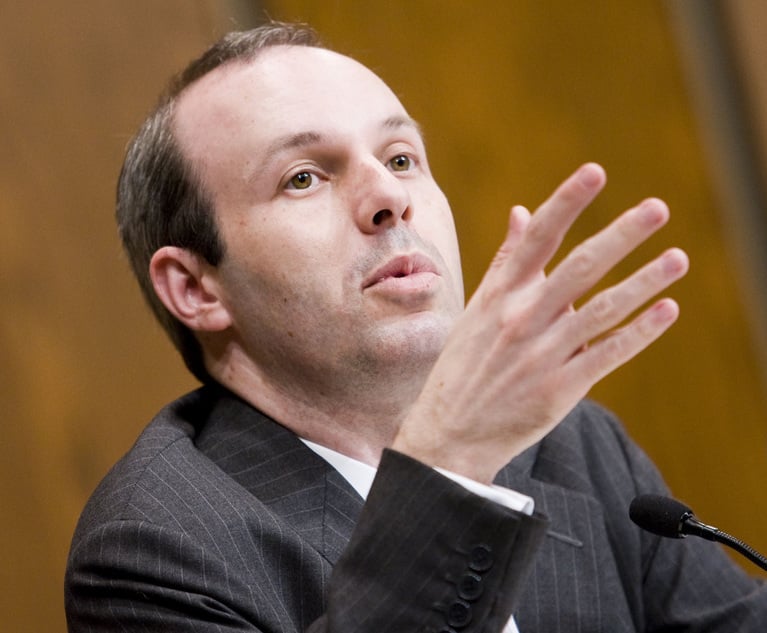
22-Count Indictment Is Just the Start of SCOTUSBlog Atty's Legal Problems, Experts Say
5 minute read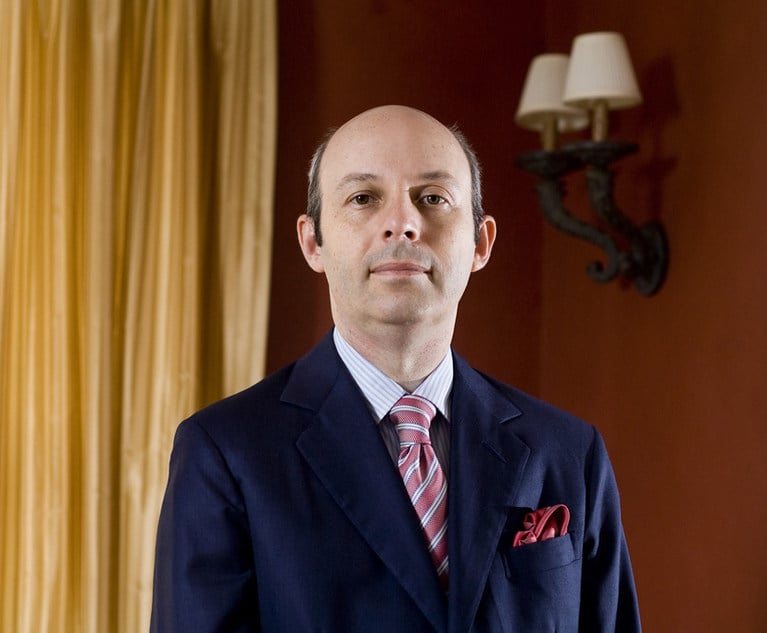
SCOTUSblog Co-Founder Tom Goldstein Misused Law Firm Funds, According to Federal Indictment
2 minute read
First Department Attorneys Facing Possible Suspension for Failing to Register
1 minute read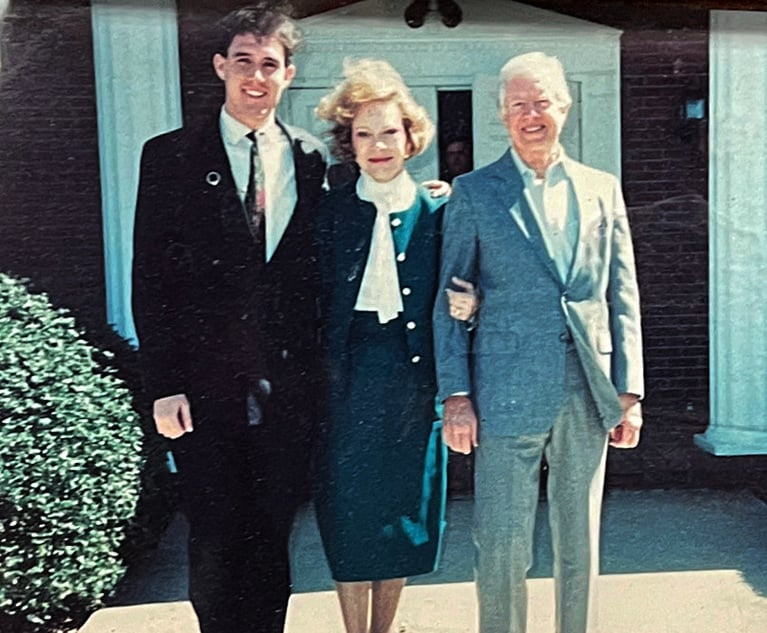
Lessons in Mediation & Negotiation: Attorneys' Reflections on Jimmy Carter
Trending Stories
- 1E-discovery Practitioners Are Racing to Adapt to Social Media’s Evolving Landscape
- 2The Law Firm Disrupted: For Office Policies, Big Law Has Its Ear to the Market, Not to Trump
- 3FTC Finalizes Child Online Privacy Rule Updates, But Ferguson Eyes Further Changes
- 4Chief Judge Joins Panel Exploring Causes for Public's Eroding Faith in NY Legal System
- 5Pogo Stick Maker Wants Financing Company to Pay $20M After Bailing Out Client
Who Got The Work
J. Brugh Lower of Gibbons has entered an appearance for industrial equipment supplier Devco Corporation in a pending trademark infringement lawsuit. The suit, accusing the defendant of selling knock-off Graco products, was filed Dec. 18 in New Jersey District Court by Rivkin Radler on behalf of Graco Inc. and Graco Minnesota. The case, assigned to U.S. District Judge Zahid N. Quraishi, is 3:24-cv-11294, Graco Inc. et al v. Devco Corporation.
Who Got The Work
Rebecca Maller-Stein and Kent A. Yalowitz of Arnold & Porter Kaye Scholer have entered their appearances for Hanaco Venture Capital and its executives, Lior Prosor and David Frankel, in a pending securities lawsuit. The action, filed on Dec. 24 in New York Southern District Court by Zell, Aron & Co. on behalf of Goldeneye Advisors, accuses the defendants of negligently and fraudulently managing the plaintiff's $1 million investment. The case, assigned to U.S. District Judge Vernon S. Broderick, is 1:24-cv-09918, Goldeneye Advisors, LLC v. Hanaco Venture Capital, Ltd. et al.
Who Got The Work
Attorneys from A&O Shearman has stepped in as defense counsel for Toronto-Dominion Bank and other defendants in a pending securities class action. The suit, filed Dec. 11 in New York Southern District Court by Bleichmar Fonti & Auld, accuses the defendants of concealing the bank's 'pervasive' deficiencies in regards to its compliance with the Bank Secrecy Act and the quality of its anti-money laundering controls. The case, assigned to U.S. District Judge Arun Subramanian, is 1:24-cv-09445, Gonzalez v. The Toronto-Dominion Bank et al.
Who Got The Work
Crown Castle International, a Pennsylvania company providing shared communications infrastructure, has turned to Luke D. Wolf of Gordon Rees Scully Mansukhani to fend off a pending breach-of-contract lawsuit. The court action, filed Nov. 25 in Michigan Eastern District Court by Hooper Hathaway PC on behalf of The Town Residences LLC, accuses Crown Castle of failing to transfer approximately $30,000 in utility payments from T-Mobile in breach of a roof-top lease and assignment agreement. The case, assigned to U.S. District Judge Susan K. Declercq, is 2:24-cv-13131, The Town Residences LLC v. T-Mobile US, Inc. et al.
Who Got The Work
Wilfred P. Coronato and Daniel M. Schwartz of McCarter & English have stepped in as defense counsel to Electrolux Home Products Inc. in a pending product liability lawsuit. The court action, filed Nov. 26 in New York Eastern District Court by Poulos Lopiccolo PC and Nagel Rice LLP on behalf of David Stern, alleges that the defendant's refrigerators’ drawers and shelving repeatedly break and fall apart within months after purchase. The case, assigned to U.S. District Judge Joan M. Azrack, is 2:24-cv-08204, Stern v. Electrolux Home Products, Inc.
Featured Firms
Law Offices of Gary Martin Hays & Associates, P.C.
(470) 294-1674
Law Offices of Mark E. Salomone
(857) 444-6468
Smith & Hassler
(713) 739-1250






